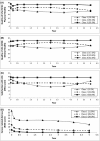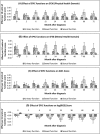Trajectories of quality of life, life satisfaction, and psychological adjustment after prostate cancer
- PMID: 27943512
- PMCID: PMC5655930
- DOI: 10.1002/pon.4342
Trajectories of quality of life, life satisfaction, and psychological adjustment after prostate cancer
Abstract
Background: To describe trajectories of health-related quality of life (QoL), life satisfaction, and psychological adjustment for men with prostate cancer over the medium to long term and identify predictors of poorer outcomes using growth mixture models.
Methods: One-thousand sixty-four (82.4% response) men diagnosed with prostate cancer were recruited close to diagnosis and assessed over a 72-month (6-year) period with self-report assessment of health-related QoL, life satisfaction, cancer-related distress, and prostate specific antigen anxiety. Urinary, bowel, and sexual function were also assessed using validated questionnaires.
Results: Poorer physical QOL was predicted by older age, lower education, lower income, comorbidities, and receiving hormone therapy. Lower life satisfaction was related to younger age, lower income, not being partnered, and comorbidities. Poorer psychological trajectories were predicted by younger age, lower income, comorbidities, and receiving radical prostatectomy or brachytherapy. Better urinary, bowel, and sexual function were related to better global outcomes over time. Anxiety about prostate specific antigen testing was rare.
Conclusions: Distinct trajectories exist for medium- to long-term QoL, life satisfaction, and psychological adjustment after prostate cancer; with age and socioeconomic deprivation playing a differential role in men's survivorship profile and the impact of functional status on outcomes increasing over time. These results reinforce the need for an appraisal of men's life course in addition to treatment side effects when planning survivorship care after cancer.
Keywords: cancer; longitudinal; oncology; prostate; psychological distress; quality of life.
© 2016 The Authors. Psycho-Oncology Published by John Wiley & Sons Ltd.
Figures


References
-
- Ferlay J, Soerjomataram I, Ervik M, et al. GLOBOCAN 2012 v1.0, cancer incidence and mortality worldwide: IARC CancerBase No. 11. 2012: http://globocan.iarc.fr/Pages/fact_sheets_cancer.aspx. Accessed 11 July 2016.
-
- Winter A, Sirri E, Jansen L, et al. Comparison of prostate cancer survival in Germany and the USA: can differences be attributed to differences in stage distributions? BJU Int. 2016. doi: 10.1111/bju.13537 - DOI - PubMed
-
- Baade PD, Youlden DR, Chambers SK. When do I know I am cured? Using conditional estimates to provide better information about cancer survival prospects. Med J Aust. 2011;194(2):73. - PubMed
-
- Klaff R, Rosell J, Varenhorst E, Sandblom G. The long‐term disease‐specific mortality of low‐risk localized prostate cancer: a prospective population‐based register study over two decades. Urology. 2016;91:77–82. - PubMed
-
- Surbone A, Tralongo P. Categorization of cancer survivors: why we need it. J Clin Oncol. 2016;34(28):3372–3374. - PubMed
MeSH terms
LinkOut - more resources
Full Text Sources
Other Literature Sources
Medical

